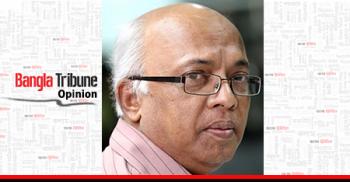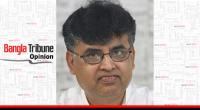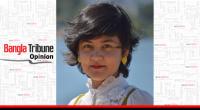 How do I remember Bangabandhu? I remember him in a thousand and one ways.
How do I remember Bangabandhu? I remember him in a thousand and one ways.
I remember him in the same way that a grateful Bengali nation does and will always do. And yet there has been that certain way in which I have consistently recalled the contributions Bangabandhu made to this country, in the way he enhanced our understanding of ourselves through his often lonely struggle for democracy.
And that is for me, for everyone in this country, an enduring part of the history that Bangabandhu embodied in his lifetime and symbolizes in his absence. He is our history, our epic saga of liberty. It was forever democracy, the wishes of the people, he upheld even in the darkest periods of his life. When individuals, all these years after the arrival of freedom in this land, debate the issue of why he did not leave his home in March 1971 and seek shelter in a secure place, they do not remember that Sheikh Mujibur Rahman was not a man to run from the fearsome scowl of the state. Constitutionalism was a fundamental underpinning of his politics. Even when he decreed a change in national politics in January 1975, he felt it to be his moral duty to inform the country that the exercise had been in consonance with political conventions.
Yes, Bangabandhu could have escaped even as the murderous soldiers of the Pakistan occupation army drew close to his home minutes into his declaration of independence in the early moments of 26 March. Tajuddin Ahmad and everyone else in his party desperately wanted him to leave his home and his city. How could he do that? Why would he do that? In all the years the state persecuted him, beginning in 1948 and proceeding through the 1950s and all the way well into the 1960s, he had not run from those who arrived at his doorstep to haul him away to prison. He was carrying forward the tradition set by Mahatma Gandhi and Jawaharlal Nehru. More than that, he was putting in place his own definition of politics as he felt it ought to be. His belief in democracy, in the ultimate triumph of his people, was integral to his character. Democrats do not flee in the face of danger. They stare danger into submission by standing up to it. In Bangabandhu’s presence, danger crumbled.
And so a calm Bangabandhu waited for the enemy, knowing full well that this time he might not return to his family, indeed to his nation. Throughout the nine months he spent in darkness --- with no newspapers or radio or television, with no one to share his thoughts with, with no idea of the genocide being perpetrated on his people --- he remained unbowed. That is what I recall on a day that should have been his ninety-ninth birthday. His head was always held high even when his followers and detractors alike were not quite sure he would emerge free of his chain of ordeals. At the height of the Agartala Conspiracy Case in June 1968, his legendary courage did not fail him. He made his tormentors quake in their boots. It was a simple, loud statement of intent which issued from him: “Anyone who wishes to live in Bangladesh will have to talk to Sheikh Mujibur Rahman.”
Here was a political leader on trial for his life. And here was his demonstration of courage, at once inspirational and confident. It was boldness two-fold. That he mattered above every other politician in the province (it was yet to be a country) was made clear by him. That the land whose struggle for democratic rights he identified with his beliefs was to be called Bangladesh and not East Pakistan was proclaimed by him before that special tribunal tasked with the macabre job of finishing him off. But if Agartala did not finish him, so reasoned his enemies, Mianwali in 1971 would do the job very well. After all, his ‘crime’ was to have ‘waged war against Pakistan.’ That fearsome atmosphere, as the record tells us, did not make him genuflect before the military tribunal determined to hang him. Bangabandhu simply did not recognize the jurisdiction of the tribunal. The junta passed a sentence of death on him in November 1971. By January 1972, he was out of that medieval confinement. The world was his oyster. He was the founding father of Bangladesh, its President, the arbiter of its destiny.
Bangabandhu’s self-esteem and his faith in the ability of his people to work miracles were wondrously infectious. It was all a throwback to the strength of personality which in an earlier era defined Deshbandhu Chittaranjan Das and Netaji Subhas Chandra Bose. With these two assertive Bengali politicians Bangabandhu is part of the pantheon of historical greatness. He was a complete politician; and in him came the full measure of a man whose love for his country was without blemish, without question, without ambivalence. He laughed uproariously, filled the room and indeed an entire whole landscape with his presence. Meeting him or simply being in his presence, at close quarters or at a distance, was but a partaking of the radiance which sparkled in him, in that smile, in that voice, in that striding across the hall and across the garden.
That is how I recall Bangabandhu. And there is more. Amidst the scent of roses in a city far from home, far removed in time, he pulled my cheeks, in affection that can only be the preserve of the great and the humble, and made me have dinner with him. On an evening dripping rain through the trees outside the old Ganobhaban, he asked me to go home and focus on my studies. On an afternoon awash in the profundity of cosmic sadness, in Tungipara, twenty one years into his silence, I washed the coffin which had borne him to his ancestral village the day after organized assassination felled him --- and felled us --- the heart cracking in me.
He loved the melody of the river. He hummed the serenity-laced songs of Tagore. He was enthused by the radical poetry of Nazrul. He walked the hundreds and then the thousands of miles, those dusty village paths, to connect with his people, to let them know that the future was theirs, that they were the inheritors of a tradition steeped in the richness of time and space.
Here was, and forever will be, Bangabandhu Sheikh Mujibur Rahman for me. The passport I hold in my hand at foreign airports is the pride he instilled in me. The stories I relate about my country, at home and away from home, are tales he wove through his belief in himself, in his people.
He was Sheikh Shaheb for his contemporaries. He was Mujib Bhai to those who watched his rise to greatness. He was ‘amago Mozibor’ to the millions of workers and peasants who saw the light in his eyes and in that brilliance perceived their starlit path to freedom.
This was, and forever will be, Bangabandhu Sheikh Mujibur Rahman for me, for the generations to be.
Syed Badrul Ahsan is the editor in charge at the Asian Age.


